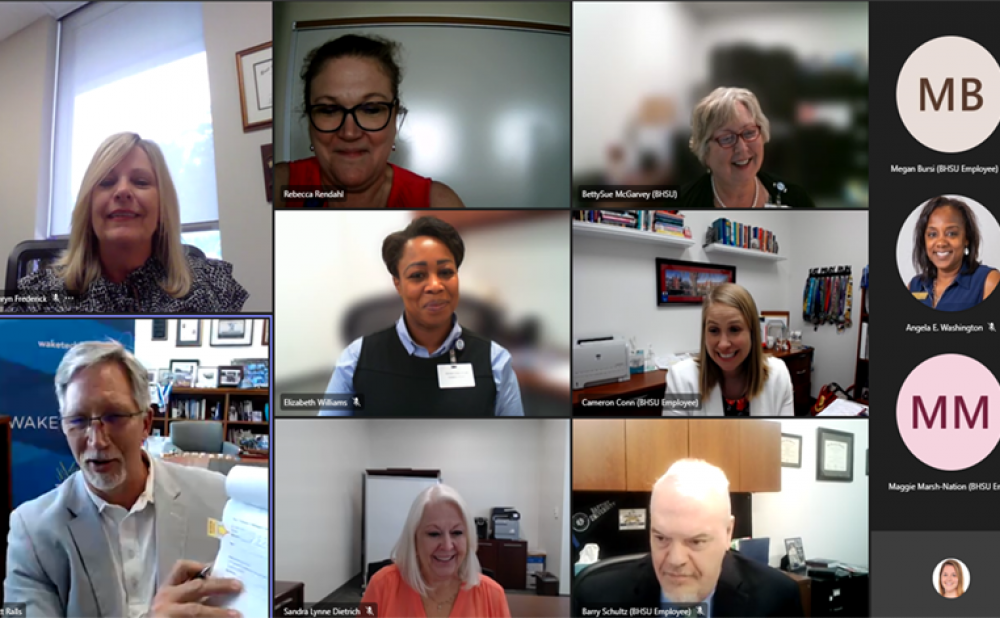BHSU and Wake Tech Announce Agreement for Bachelor’s in Neurodiagnostic Technology

Great things are happening to increase the number of highly trained neurodiagnostic technologists available to help patients with the treatment of conditions like epilepsy, traumatic brain injuries, strokes, and neurological disorders such as Alzheimer’s disease.
Baptist Health Sciences University President Betty Sue McGarvey and Wake Technical Community College President Scott Ralls virtually signed an articulation agreement on Wednesday, June 15, which will allow Wake Tech students to transfer up to 53 hours of electroneurodiagnostic technology program credits toward BHSU’s corresponding bachelor’s program. Wake Tech is North Carolina’s largest community college, serving more than 70,000 adults annually.
Neurodiagnostic technology (NDT) is a growing field with a very strong need for technologists.
BHSU launched its baccalaureate degree in NDT in the fall of 2020. In the spring of 2022, the program had its first graduate with a bachelor’s in NDT. That graduate passed the CLTM exam for certification in long-term monitoring from ABRET Neurodiagnostic Credentialing and Accreditation.
“We’re hoping to train people who will be leaders in the field of NDT, which is growing, with an expanded scope of practice,” said Dr. Maggie Marsh-Nation, program chair of neurodiagnostic technology at Baptist University, who also noted that there’s “an incredible shortage” of neurodiagnostic technologists.
Dr. Elizabeth Williams, dean of Allied Health and professor of Public Health at Baptist University, said that Wake Tech students pursuing a bachelor’s in NDT will be well prepared to make a difference in the discipline.
“We’re particularly proud of this agreement with Wake Tech, because we see the potential for it to increase not only the number of students who are matriculating at BHSU, but also expand the skills of those in the profession as the field of NDT grows. We want to set the standard of what NDT professionals look like and do in communities across the country,” said Dr. Williams.
The bachelor’s degree in NDT from Baptist University offers students advancement beyond the basics. Graduates with a bachelor’s degree in NDT take courses in new technologies, such as magnetoencephalography, as well as long-term monitoring for epilepsy in preparation for epilepsy surgery, neuropsychology, neuroimaging, autonomic testing and the advanced sciences that prepare professionals for intraoperative neuromonitoring training.
“I think anything that involves the brain and nervous system is interesting. The students have been fascinated by it. Once they get into an EEG lab where they see the patients who have suffered strokes, seizures or head injuries, it becomes so real. They can apply what they’ve learned and it’s so exciting for them. We had students this week in surgery for the first time watching an epilepsy surgery as they were removing the part of the brain causing seizures. There are great rewards in being part of the team that helps people turn their lives around,” said Dr. Marsh-Nation.
The degrees in NDT from Baptist University speak to multiple perspective student populations. Those pursuing an associate degree may enter the workforce for the first time, while people who are currently working in the field might need additional credentials and advanced training, so they may pursue the bachelor’s degree part-time while working. If students are already working in NDT, they may receive block credit for credentials or transfer an associate degree to help them work toward their bachelor’s degree. In such cases, students can complete their bachelor’s degree online.
With online classes, BHSU students can participate in the programs from anywhere in the country. Clinical sites for training are available in multiple cities in addition to Memphis, such as Little Rock, Nashville and Los Angeles. Only three weeks are required on campus in Memphis for intensive lab training for the associate degree.
“Because of Dr. Marsh-Nation’s long history in the field and many professional relationships, students don’t have to relocate to the Memphis area, but can fulfill their associate degree clinical requirements where they live,” said Dr. Williams. There are no additional lab or clinical requirements for bachelor’s degree students, making the program ideal for working professionals.
According to Dr. Marsh-Nation, the demand for qualified NDT professionals is so high, every student pursuing an associate degree has been employed before they graduate. “As soon as the word gets out that graduation is coming, I get a ton of emails from people wanting to interview our graduates,” said Dr. Marsh-Nation. The combined total number of graduates from all the NDT schools in the country is between 300 and 400 students each year, far below the demand.
One important advantage of Baptist University over a liberal arts institution for students who want to go into the medical field is that the general education courses are geared toward going into health professions.
“We want to create well-rounded health care providers, not just skilled in disciplines, but who understand the needs of those they’re providing care for. We emphasize students’ understanding of the social determinants of health and appreciation of diverse people, and contexts where they, as providers, will serve. BHSU’s curriculum is designed to reinforce this learning, which ultimately leads to better patient outcomes, because it improves the quality of patient care,” noted Dr. Williams.
She added that we need to prepare for the rise in conditions related to stroke or neurological disorders such as Alzheimer’s disease in our aging population. These conditions, as well as traumatic brain injuries, require the kind of specialized assistance that neurodiagnostic technologists can provide.
“We are setting the groundwork for addressing important clinical care needs. As a person who studies Public Health issues, I believe the services and science required to care for an increasingly aging population with neurocognitive issues and young people who are most susceptible to traumatic brain injuries necessitates investing in neurodiagnostic technology education to have a tremendous impact on these needs,” said Dr. Williams.





